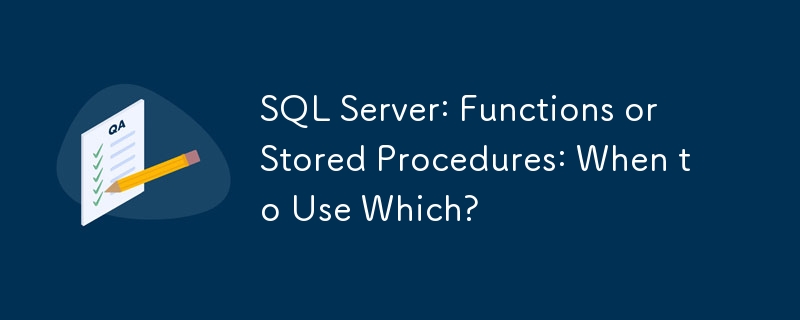Home >Database >Mysql Tutorial >SQL Server: Functions or Stored Procedures: When to Use Which?
SQL Server: Functions or Stored Procedures: When to Use Which?
- Linda HamiltonOriginal
- 2025-01-17 23:27:131087browse

SQL Server: Functions and Stored Procedures – A Practical Guide
In SQL Server development, understanding the distinctions between functions and stored procedures is crucial for efficient data management. Both are powerful tools, but their applications differ significantly, impacting how you handle data manipulation and retrieval.
Key Differences: Functions vs. Stored Procedures
Functions:
- Primary Role: Compute and return a single value.
- Database Impact: Do not directly alter the database state; they are read-only.
-
Usage: Can be seamlessly integrated into SQL queries, even within
SELECTstatements or joins.
Stored Procedures:
- Primary Role: Execute a series of SQL statements to perform complex operations.
-
Database Impact: Can modify the database through
INSERT,UPDATE, orDELETEstatements. - Usage: Accept input parameters and can return output parameters, enabling flexible and controlled data processing.
Choosing the Right Tool for the Job
- Use Functions for: Calculations, string manipulation, date formatting, and data validation – essentially, any task that needs a single computed result.
- Use Stored Procedures for: Complex multi-step operations requiring database modifications, implementing business logic, or encapsulating data access routines.
Further Considerations:
- Functions are frequently employed for data cleansing, extracting specific fields, or generating dynamic values within queries.
- Stored procedures offer greater customization and power, suitable for intricate data manipulation and complex business rules.
- Generally, functions exhibit faster execution speeds compared to stored procedures due to their more focused functionality.
In conclusion, functions excel at returning computed values without altering the database, while stored procedures provide broader control and flexibility for managing data and database structure. By understanding their respective strengths and limitations, you can optimize your SQL Server applications for both performance and maintainability.
The above is the detailed content of SQL Server: Functions or Stored Procedures: When to Use Which?. For more information, please follow other related articles on the PHP Chinese website!

